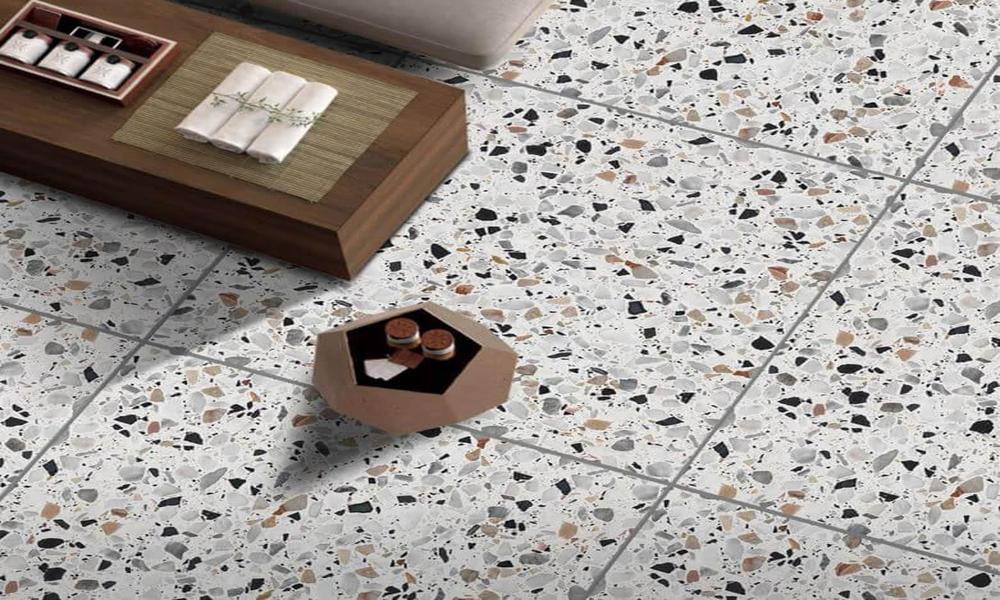Terrazzo tiles is a popular flooring material that has been used for centuries due to its durability, beauty, and low maintenance requirements. It is made by embedding small pieces of marble, granite, glass, or other aggregates into a cement or resin base, which is then ground and polished to create a smooth, even surface. In recent years, terrazzo has seen a resurgence in popularity, with many homeowners and designers incorporating it into their homes and commercial spaces.
One question that often arises is whether terrazzo tiles are different from terrazzo flooring. The answer is yes, they are different, and in this article, we’ll explore the differences between the two.
Terrazzo Flooring
Terrazzo flooring is typically installed as a seamless, poured-in-place surface that is custom-made to fit the specific space it is being installed in. It is created by mixing the chosen aggregates with a cement or resin binder, which is then poured and leveled onto the substrate. The surface is then ground and polished to a smooth, shiny finish. The result is a beautiful and durable floor that can last for decades with proper care.
One of the main advantages of terrazzo flooring is that it can be completely customized to suit any design aesthetic or color scheme. The aggregates used can vary in size, shape, and color, and the binder can be tinted to create a wide range of hues. Additionally, because terrazzo flooring is poured in place, it can be made to fit any shape or size of space, including curved walls and columns.
However, there are some downsides to terrazzo flooring. It can be expensive and time-consuming to install, as it requires skilled labor and specialized equipment. Additionally, if the floor is damaged or stained, it can be difficult and costly to repair.
Terrazzo Tiles
Terrazzo tiles, on the other hand, are pre-made tiles that are created by compressing the same aggregates used in traditional terrazzo flooring into a precast tile form. They are typically available in standard sizes, such as 12×12 inches or 24×24 inches, and can be installed using traditional tile-setting methods.
One advantage of terrazzo tiles is that they are often less expensive and easier to install than traditional poured-in-place terrazzo flooring. They can be installed using standard tile-setting tools and techniques, and because they are pre-made, they are often available for immediate delivery.
Another advantage of terrazzo tiles is that they can be used to create unique patterns and designs. By combining different colors and sizes of tiles, designers can create intricate and eye-catching designs that would be difficult to achieve with traditional poured-in-place terrazzo.
However, there are also some downsides to terrazzo tiles. Because they are pre-made, they may not be a perfect match for the specific design aesthetic or color scheme of a space. Additionally, because they are installed with grout lines, they may not have the same seamless, continuous appearance as poured-in-place terrazzo flooring.
Conclusion
In conclusion, while both terrazzo flooring and terrazzo tiles share many of the same characteristics, there are some key differences between the two. Terrazzo flooring is a custom-made, poured-in-place surface that offers complete design flexibility and durability but can be expensive and time-consuming to install. Terrazzo tiles, on the other hand, are pre-made and can be easier and less expensive to install but may not offer the same level of customization or seamless appearance as poured-in-place terrazzo. Ultimately, the choice between the two will depend on the specific needs and design goals of a given project.
Related posts
Categories
Recent Posts
Tags
Calendar
| M | T | W | T | F | S | S |
|---|---|---|---|---|---|---|
| 1 | ||||||
| 2 | 3 | 4 | 5 | 6 | 7 | 8 |
| 9 | 10 | 11 | 12 | 13 | 14 | 15 |
| 16 | 17 | 18 | 19 | 20 | 21 | 22 |
| 23 | 24 | 25 | 26 | 27 | 28 | 29 |
| 30 | ||||||

